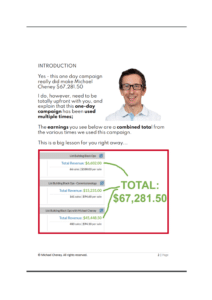Learn how to set up an affiliate blog and website, from choosing the right niche to driving traffic and monetizing your content, with these comprehensive steps and strategies.

Introduction to Affiliate Marketing
Affiliate marketing is a lucrative avenue for individuals to earn a commission by promoting products or services through unique affiliate links. This form of marketing has seen exponential growth, with the global affiliate marketing industry projected to reach £8.2 billion by 2022, underscoring its vast potential. Successful affiliate marketers understand the importance of cultivating trust with their audience through authentic and valuable content that resonates with their readers.
One example that illustrates the power of affiliate marketing is the success story of Pat Flynn, a renowned affiliate marketer who generates a substantial income through his blog, Smart Passive Income. By creating high-quality content that provides value to his audience and strategically promoting relevant products, Pat Flynn has built a loyal following and established himself as a trusted authority in the affiliate marketing website space.
When delving into affiliate marketing, individuals often start by selecting a niche that aligns with their interests and expertise. By focusing on a specific niche, such as sustainable living, travel gear, or personal finance, affiliate marketers can tailor their content to cater to a targeted audience with specific needs and preferences. This targeted approach not only enhances engagement but also increases the likelihood of conversions, as the audience finds the promoted products or services highly relevant to their interests.
Choosing the Right Niche
Choosing the right niche is a critical step in the affiliate marketing journey. Researching the competition within potential niches can help identify gaps and opportunities for affiliate marketing. For example, analysing competitors in the wellness niche might reveal specific areas where there is a demand for eco-friendly fitness products, presenting an opportunity for affiliate marketers to fill that gap and cater to environmentally conscious consumers.
Understanding the demographics, interests, and purchasing behaviour of the target audience is pivotal in selecting a profitable niche. Suppose an affiliate marketer is targeting a younger demographic interested in technology. In that case, choosing a niche that focuses on the latest gadgets, tech reviews, or software solutions can align with the audience’s preferences and lead to higher conversion rates.
Moreover, utilising keyword research tools can assist in identifying popular search terms and trending topics within chosen niches. By conducting keyword research, affiliate marketers can uncover valuable insights into the language and terminology used by their target audience, allowing them to create content that resonates and ranks well in search engine results, driving organic traffic to their affiliate blog.
 Setting Up Your Website
Setting Up Your Website
Setting up a website for affiliate marketing requires careful planning and execution. One crucial aspect is selecting a reliable web hosting provider to ensure optimal website uptime and security. Bluehost, for example, is a popular choice among affiliate marketers due to its user-friendly interface, affordability, and excellent customer support, making it an ideal option for those starting their affiliate blog.
Integrating SEO plugins such as Yoast SEO is essential for optimising content for search engines and enhancing organic visibility. These plugins offer features like keyword optimisation, meta tag management, and content analysis, empowering affiliate marketers to improve their site’s search engine rankings and attract more organic traffic.
In addition to SEO plugins, regular updates to website plugins and themes are crucial for maintaining site performance and security. By staying up to date with the latest software updates and security patches, affiliate marketers can safeguard their website against potential cyber threats, ensure smooth functionality, and provide a seamless user experience for visitors, ultimately contributing to the success of their affiliate marketing endeavours.
Designing Your Affiliate Website
The design of an affiliate website plays a significant role in engaging visitors and driving conversions. Implementing a responsive design that adapts seamlessly to various devices, including mobile phones and tablets, is essential for providing a positive user experience. For instance, a responsive design ensures that visitors can access the website’s content and features conveniently, regardless of the device they are using, contributing to lower bounce rates and increased engagement.
Utilising high-quality images and graphics that are relevant to the niche can enhance the visual appeal of the website and capture visitors’ attention. For example, an affiliate blog focusing on travel gear can feature stunning images of destinations and travel accessories, creating an immersive experience for users and compelling them to explore further.
A clear call-to-action (CTA) on each page guides visitors on the desired actions, such as clicking on affiliate links or signing up for a newsletter. Strategic placement of CTAs can direct users towards conversion points, encouraging them to take specific actions that align with the affiliate marketer’s goals. By creating compelling and actionable CTAs, affiliate marketers can drive engagement and increase the likelihood of conversions on their website.
Content Creation for Affiliate Blogs
Creating compelling and valuable content is at the core of a successful affiliate blog. Conducting competitor analysis provides valuable insights into the type of content that resonates with the target audience and can guide content creation strategies. For example, analysing competitor blogs in the fashion niche can reveal popular topics, content formats, and engagement strategies that can inspire affiliate marketers to create similar engaging content for their audience.
In addition to competitor analysis, focusing on evergreen content that remains relevant over time can drive consistent traffic to the affiliate blog. Evergreen content, such as comprehensive guides, tutorials, or product reviews, continues to attract visitors and generate affiliate sales long after it is published, serving as a valuable asset for the affiliate marketer.
Incorporating multimedia elements like videos, infographics, and interactive content can enhance user engagement and retention on the website. For instance, creating a video review of a product or an interactive quiz related to a niche topic can captivate visitors and encourage them to spend more time on the site, increasing the chances of them exploring affiliate products and making a purchase.
Applying for Affiliate Programs
When applying for affiliate programs, thorough research and careful consideration are paramount to selecting the best partnerships for your affiliate blog. Researching and comparing different affiliate programs allow affiliate marketers to identify those offering competitive commission rates and products that resonate with their audience. For instance, an affiliate marketer focusing on home decor may choose to partner with affiliate programs that offer a wide range of stylish and affordable home furnishing products.
Some affiliate programs provide promotional materials like banners, email templates, and social media graphics to assist affiliates in their marketing efforts. By leveraging these resources, affiliate marketers can create visually appealing and cohesive promotional content that aligns with the brand’s messaging, enhancing the overall effectiveness of their affiliate campaigns.
Adhering to affiliate program guidelines, including restrictions on promotional methods and disclosure requirements, is crucial to maintaining a positive relationship with merchants and complying with regulatory standards. By familiarising themselves with the terms and conditions of each affiliate program and adhering to best practices, affiliate marketers can build trust with their audience, protect their reputation, and ensure a sustainable income stream from their affiliate partnerships.
Utilising Affiliate Marketing Tools
The use of affiliate marketing tools can streamline operations and enhance the performance of affiliate marketing campaigns. Affiliate tracking software like Google Analytics enables affiliates to monitor website traffic, conversions, and user behaviour, providing valuable insights for optimising their strategies. By analysing key metrics such as traffic sources, bounce rates, and conversion rates, affiliate marketers can identify areas for improvement and make data-driven decisions to enhance their affiliate campaigns.
Email marketing tools such as Mailchimp offer powerful features for building and nurturing relationships with email subscribers. Through personalised email campaigns, automated workflows, and detailed analytics, affiliate marketers can engage with their audience effectively, deliver targeted content, and promote affiliate products in a strategic and compelling manner, driving conversions and increasing revenue.
Social media management platforms like Hootsuite provide a centralised hub for managing social media accounts, scheduling posts, and tracking performance metrics. By automating social media activities, monitoring engagement, and analysing the effectiveness of social media campaigns, affiliate marketers can expand their reach, engage with their audience, and drive traffic to their affiliate website, ultimately enhancing their affiliate marketing efforts.
 Promoting Your Affiliate Content
Promoting Your Affiliate Content
Promoting affiliate content effectively is essential for driving traffic and generating conversions on an affiliate blog. Collaborating with influencers in the niche can expand the reach of affiliate content to a wider audience. For example, partnering with a fitness influencer to promote workout gear on a fitness affiliate blog can introduce the brand to a new audience segment and drive more traffic and sales.
Participating in relevant online communities and forums is a valuable strategy for driving targeted traffic to the affiliate blog. By engaging in discussions, providing valuable insights, and sharing expertise within online communities related to the niche, affiliate marketers can establish themselves as industry authorities, build trust with potential customers, and drive quality traffic to their website.
Running paid advertising campaigns on platforms like Facebook Ads can increase visibility and attract potential customers to the affiliate website. By leveraging advanced targeting options, creating compelling ad copy, and monitoring campaign performance, affiliate marketers can reach specific demographics interested in their niche, drive traffic to their blog, and maximise the impact of their advertising budget to generate more conversions and revenue.
Monetising Your Affiliate Blog
Diversifying revenue streams and optimising monetisation strategies are key to maximising income potential on an affiliate blog. In addition to affiliate marketing, incorporating sponsored content and display advertising can increase revenue opportunities. For instance, collaborating with brands on sponsored posts or incorporating display ads on the blog can provide additional income streams alongside affiliate commissions.
Creating a well-structured sales funnel that guides visitors from awareness to conversion is essential for optimising affiliate marketing strategies. By strategically placing affiliate links, crafting compelling CTAs, and providing valuable content at each stage of the customer journey, affiliate marketers can improve the effectiveness of their promotions, drive more conversions, and increase revenue on their affiliate blog.
Continuously testing and optimising affiliate links placement and messaging can enhance conversion rates and revenue. By conducting A/B tests, tracking performance metrics, and experimenting with different approaches to promoting affiliate products, affiliate marketers can identify what resonates best with their audience, refine their strategies, and maximise their earning potential on their affiliate blog.
 Driving Traffic to Your Affiliate Blog
Driving Traffic to Your Affiliate Blog
Driving traffic to an affiliate blog is crucial for expanding reach, increasing visibility, and generating conversions. Implementing on-page SEO practices such as optimising meta tags and headings can improve the visibility of affiliate content on search engines. By incorporating relevant keywords, meta descriptions, and headings into the content, affiliate marketers can enhance their blog’s search engine rankings and attract more organic traffic.
Building backlinks from reputable websites within the niche can boost the domain authority of the affiliate blog and improve search engine rankings. For example, guest posting on authoritative websites, collaborating with industry influencers, or participating in link building campaigns can help affiliate marketers acquire high-quality backlinks that signal credibility to search engines and drive more organic traffic to their blog.
Engaging with the audience through interactive content like quizzes, polls, or contests can increase user engagement and time spent on the website. By creating interactive and valuable content that encourages user participation, affiliate marketers can captivate visitors, foster a sense of community, and drive more traffic to their affiliate blog, ultimately leading to increased conversions and revenue.
 Legal Considerations and Transparency
Legal Considerations and Transparency
Maintaining legal compliance and transparency in affiliate marketing is essential for building trust with the audience and safeguarding the affiliate business. Including a clear disclosure statement on the website that informs visitors about the use of affiliate links helps maintain transparency. By openly disclosing affiliate relationships and potential financial incentives, affiliate marketers can establish credibility, build trust with their audience, and comply with regulatory requirements.
Complying with data protection regulations like GDPR when collecting user information for marketing purposes is crucial. By implementing data protection measures, obtaining explicit consent from users, and securely storing and processing data, affiliate marketers can protect user privacy, adhere to legal standards, and mitigate the risk of data breaches or non-compliance issues.
Seeking legal advice on affiliate marketing agreements and contracts can provide valuable protection for affiliates. By consulting with legal professionals specialised in affiliate marketing, affiliate marketers can gain insights into contract terms, understand their rights and obligations, and ensure compliance with legal requirements, reducing the risk of disputes with merchants and safeguarding their affiliate income and reputation.
Conclusion and Next Steps
Reflecting on the key learnings from setting up an affiliate blog and website can inform future strategies and improvements. By analysing performance metrics, adapting strategies based on data insights, and continuously optimising affiliate marketing efforts, affiliate marketers can drive sustained success in the competitive affiliate marketing landscape.
Continuing to monitor performance metrics and adapting strategies based on data insights can lead to sustained success in affiliate marketing. By staying informed about industry trends, exploring advanced affiliate marketing tactics such as influencer partnerships and affiliate networking, and experimenting with innovative strategies, affiliate marketers can further enhance the profitability of their affiliate blog and unlock new revenue streams.
Exploring advanced affiliate marketing tactics like influencer partnerships and affiliate networking can further enhance the profitability of the affiliate blog. By expanding reach, collaborating with industry influencers, and engaging with the affiliate marketing community, affiliate marketers can leverage new opportunities, drive more traffic, and increase revenue on their affiliate blog, paving the way for continued growth and success in the dynamic world of affiliate marketing.

If you’ve been struggling online, this report will open your eyes.


Become the Internet Marketing Millionaire’s Next Apprentice!!
 Setting Up Your Website
Setting Up Your Website Promoting Your Affiliate Content
Promoting Your Affiliate Content Driving Traffic to Your Affiliate Blog
Driving Traffic to Your Affiliate Blog Legal Considerations and Transparency
Legal Considerations and Transparency